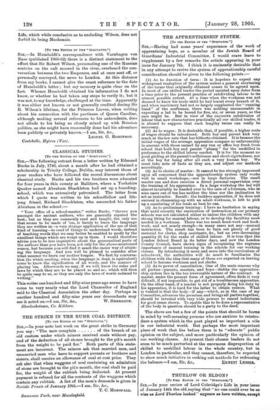THE APPRENTICESHIP SYSTEM.
[To THE EDITOR OP THY "SPECTATOR."]
Sra,—Having had some years' experience of the work of apprenticing boys, as a member of the Jewish Board of Guardians' Industrial Committee, I would crave leave to supplement by a few remarks the article appearing in your issue for January 7th. I think it is eminently desirable that in any attempt to revive the system of apprenticeship careful consideration should be given to the following points
(1) As to duration of term : It is hopeless to expect any widespread readoption of the system unless a general shortening of the terms that originally obtained comes to be agreed upon. In most of our skilled trades the period insisted upon dates from a time prior to the present practice of subdividing labour to its utmost possible extent. At a time when the workman was not deemed to know his trade until he had learnt every branch of it, and when machinery had not so largely supplanted the " cunning hand" of the craftsman, there was nothing unreasonable in expecting a lad to be bound for five, six, or seven years, as the case might be. But in view of the excessive subdivision of labour that now characterises practically all our skilled trades, it is absurd to suppose that such lengthy terms can really be necessary.
(2) As to wages : It is desirable that, if possible, a higher scale of wages should be introduced. Both boy and parent kick very
much at the low rate that has hitherto obtained. It is because the initial wages of the average apprentice compare so unfavourably in amount with those earned by any van or office boy fresh from school that both boy and parent "plump" for the unskilled in preference to the skilled labour market. It is for the moment no good girding at the parent's selfishness and short-sightedness, nor
at the boy for being after all such a very human boy. We must take note of facts as they are, and adjust our methods accordingly.
(3) As to choice of master: It cannot be too strongly impressed upon all concerned that the apprenticeship system only works well in small workshops,—not in large factories. The small master can and does exercise a direct personal supervision over the training of his apprentice. In a large workshop the lad will almost invariably be handed over to the care of a foreman, who in nine cases out of ten has neither the time nor the inclination to act as instructor. Result: the luckless apprentice, if he does not succeed in chumming-up with an adult workman, is left to pick up a smattering of his trade as best he can.
(4) As to preliminary training: I have no hesitation in saying that until recently the curriculum of instruction at our primary schools was not calculated either to imbue the children with any strong liking for manual labour, or to develop the faculties most needed in a workman. There was too much head-work and book- work, and not nearly enough—in many cases not any—manual instruction. The result has been to turn out plenty of good material for clerks, shop assistants, &c., but an ever-decreasing quantity fit for the ranks of skilled labour. It is true that the London School Board in its latter days, and now the London County Council, have shown signs of recognising the supreme importance of manual training in the schools for our working classes. By introducing it more and more into the curriculum of schoolwork, the authorities will do much to familiarise the children with the idea that many of them are expected on leaving school to become workmen and not clerks.
(5) As to power of cancellation: One of the main reasons why all parties—parents, masters, and boys—dislike the apprentice- ship system lies in the too irrevocable nature of the contract. A master, under the present form of agreement, often finds it very
difficult, if not impossible, to get rid of a troublesome apprentice. On the other hand, if a master is not properly doing his duty by his apprentice, it is hard for the latter to obtain redress. What is wanted is that the body—if any—which, as in the case of my Committee, advances the premium and brings all parties together, should be invested with very wide powers to cancel indentures for good cause shown. To enable this to be done a representative of the body in question should be a party to the deed.
The above are but a few of the points that should be borne in mind by well-meaning persons who are anxious to reintro- duce a system which in the past played so important a role in our industrial world. But perhaps the most important piece of work that lies before them is to "educate" public opinion on the subject, and more particularly the opinion of our working classes. At present their chosen leaders do not seem to be much perturbed at the enormous disproportion of skilled to unskilled labour in the whole country, but in London in particular, and they cannot, therefore, be expected to show much initiative in seeking out methods for redressing
the balance.—I am, Sir, &c., ERNEST LESSER.






















































 Previous page
Previous page